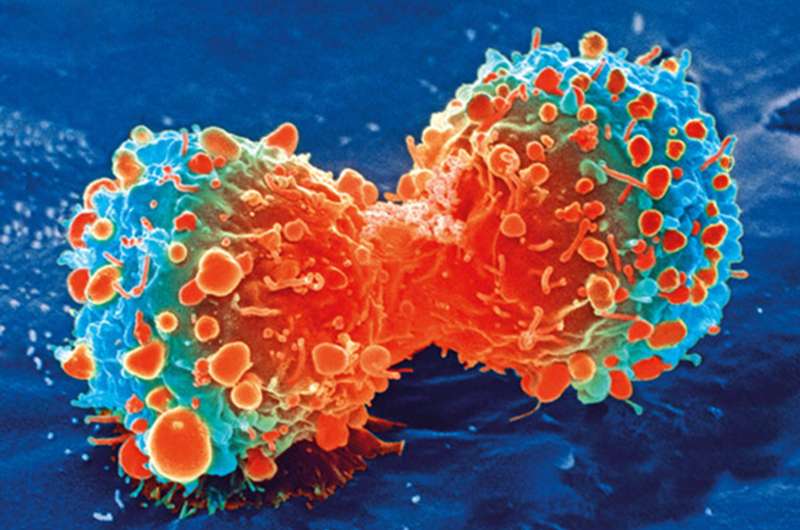This article has been reviewed according to Science X's editorial process and policies. Editors have highlighted the following attributes while ensuring the content's credibility:
fact-checked
peer-reviewed publication
trusted source
proofread
Ultrasensitive liquid biopsy tech spots cancer earlier than standard methods

An artificial intelligence-powered method for detecting tumor DNA in blood has shown unprecedented sensitivity in predicting cancer recurrence, in a study led by researchers at Weill Cornell Medicine, NewYork-Presbyterian, the New York Genome Center (NYGC) and Memorial Sloan Kettering Cancer Center (MSK). The new technology has the potential to improve cancer care with the very early detection of recurrence and close monitoring of tumor response during therapy.
In the study, which appears June 14 in Nature Medicine, the researchers showed that they could train a machine learning model, a type of artificial intelligence platform, to detect circulating tumor DNA (ctDNA) based on DNA sequencing data from patient blood tests, with very high sensitivity and accuracy. They made successful demonstrations of the technology in patients with lung cancer, melanoma, breast cancer, colorectal cancer and precancerous colorectal polyps.
"We were able to achieve a remarkable signal-to-noise enhancement, and this enabled us, for example, to detect cancer recurrence months or even years before standard clinical methods did so," said study co-corresponding author Dr. Dan Landau, a professor of medicine in the division of hematology and medical oncology at Weill Cornell Medicine and a core faculty member of the New York Genome Center.
The study's co-first author and co-corresponding author was Dr. Adam Widman, a postdoctoral fellow in the Landau Lab who is also a breast cancer oncologist at MSK. The other co-first authors were Minita Shah of NYGC, Dr. Amanda Frydendahl of Aarhus University, and Daniel Halmos of NYGC and Weill Cornell Medicine.
Liquid biopsy technology has been slow to realize its great promise. Most approaches to date have targeted relatively small sets of cancer-associated mutations, which are often too sparsely present in the blood to be detected reliably, resulting in cancer recurrences that go undetected.
Several years ago, Dr. Landau and colleagues developed an alternative approach based on whole-genome-sequencing of DNA in blood samples. They showed that they could gather much more "signal" this way, enabling more sensitive—and logistically simpler—detection of tumor DNA. Since then, this approach has been increasingly adopted by liquid biopsy developers.
In the new study, the researchers leapt ahead again, using an advanced machine learning strategy (similar to that of ChatGPT and other popular AI applications) to detect subtle patterns in sequencing data—in particular, to distinguish patterns suggestive of cancer from those suggestive of sequencing errors and other "noise."
In one test, the researchers trained their system, which they call MRD-EDGE, to recognize patient-specific tumor mutations in 15 colorectal cancer patients. Following the patients' surgery and chemotherapy, the system predicted from blood data that nine had residual cancer. Five of these patients were found—months later, with less sensitive methods—to have cancer recurrence. But there were no false negatives: none of the patients whom MRD-EDGE deemed free of tumor DNA experienced recurrence during the study window.
MRD-EDGE showed similar sensitivity in studies of early-stage lung cancer and triple-negative breast cancer patients, with early detection of all but one recurrence, and tracking of tumor status during treatment.
The researchers demonstrated that MRD-EDGE can detect even mutant DNA from precancerous colorectal adenomas—the polyps from which colorectal tumors develop.
"It had not been clear that these polyps shed detectable ctDNA, so this is a significant advance that could guide future strategies aimed at detecting premalignant lesions," said Dr. Landau, who is also a member of the Sandra and Edward Meyer Cancer Center at Weill Cornell Medicine and a hematologist/oncologist at NewYork-Presbyterian/Weill Cornell Medical Center.
Lastly, the researchers showed that even without pre-training on sequencing data from patients' tumors, MRD-EDGE could detect responses to immunotherapy in melanoma and lung cancer patients—weeks before detection with standard X-ray-based imaging.
"On the whole, MRD-EDGE addresses a big need, and we're excited about its potential and working with industry partners to try to deliver it to patients," Dr. Landau said.
More information: Adam J. Widman et al, Ultrasensitive plasma-based monitoring of tumor burden using machine-learning-guided signal enrichment, Nature Medicine (2024). DOI: 10.1038/s41591-024-03040-4 , doi.org/10.1038/s41591-024-03040-4
















